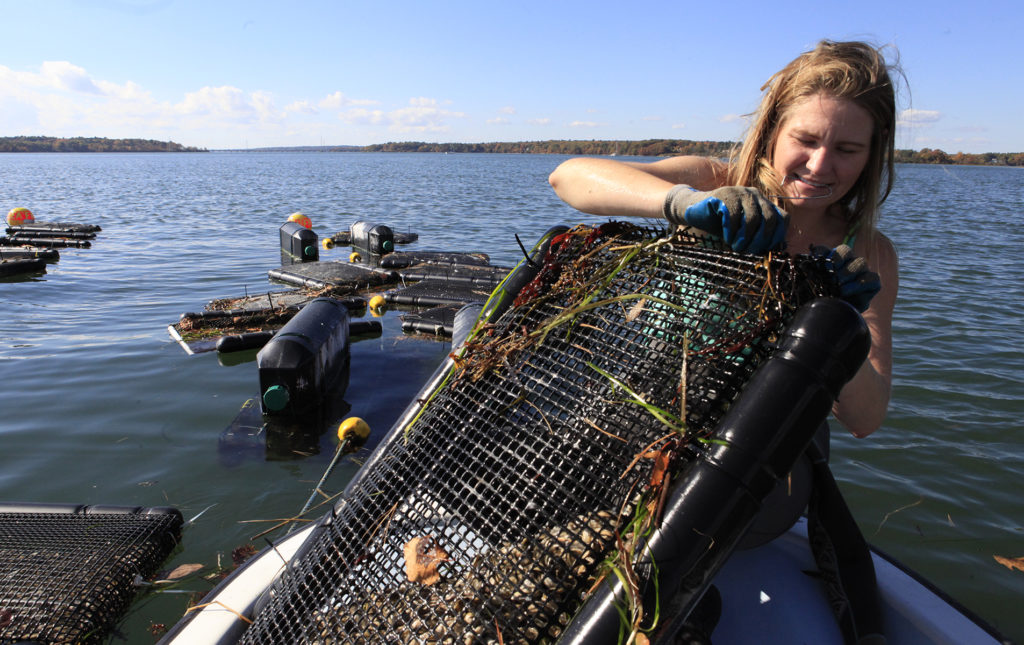Stephenie MacLagan and James Crimp are associates with the Island Institute’s Marine and Economic Development programs and part of the Aquaculture team.
Join our second Aquaculture Business Development cohort
Have you ever thought about gaining a new source of income through growing mussels, oysters or seaweed? Now is a great time to launch your small-scale aquaculture business. Through our Aquaculture Business Development (ABD) program, the Island Institute is working to help fishermen and people from fishing communities diversify into shellfish or seaweed aquaculture.
Aquaculture is a natural business expansion for those already working on the water. Starting a complementary business can absorb the impacts of potential changes in the lobster industry, and growing kelp can help absorb some of the effects of climate change. Fishermen and communities with strong fishing cultures are well-suited for establishing shellfish or seaweed aquaculture operations. In addition to their familiarity with working on the water, lobstering and other marine trades already involve operating a business. Fishing communities, who identify with working waterfronts, also see themselves on the front lines of climate change and desire to ensure opportunities for future generations to address declining or aging populations.
“I have three boys, and I’ll be able to show them that another fishery is possible other than lobstering. Aquaculture will be something really important to the future of Maine’s coastal community.”
– Jeff Putnam, fisherman, ABD 2016 member, and now growing oysters with his family
“I became really interested in aquaculture from both an environmental perspective and an economic perspective.”
– Amanda Moeser, ABD 2016 member and now owner of Lanes Island Oysters
Economists, scientists and industry experts say that Maine’s growth potential in aquaculture is enormous. The area covered by all of Maine’s current aquaculture leases could fit inside Rockland’s harbor, meanwhile the demand for the Maine brand is high. In 2016, the Gulf of Maine Research Institute found that the Maine oyster industry would triple in size, and the mussel industry would grow six-fold, between 2015 and 2030. We anticipate that the ABD program will generate an $8.5 million economic impact along Maine’s coast from 2016 through 2020.

What’s involved?
We are looking to work with Mainers who are highly motivated to start their shellfish or seaweed aquaculture businesses within the next two years. Like starting or expanding any business, it can be challenging to wade through unfamiliar regulations, create a business plan, and understand the complexities of the supply chain.
“When do I want to sell my kelp? Do I want to dry it myself and have my own product? Do I sell it direct to restaurants? It’s all about making money, so I don’t have to do any carpentry work in the wintertime.”
– Karen Cooper, fisherman, ABD 2016 member, and now growing seaweed
The value of the ABD program comes from:
- Learning about mussels, oysters, or seaweed species, and biosecurity
- Understanding the state leasing process, site selection, and community relations
- Visiting established aquaculture operations in Maine and southern New England
- Getting connected to existing aquaculturists and industry experts
- Developing a business plan, marketing strategy, and farm management plan
- Gaining access to financing and continued business support for your first three years of operation
ABD cohort members must be prepared to invest significant time and energy in exploring their new business, but our staff will provide guidance and resources along the way. We anticipate an in-person group meeting in April to kick off this year’s cohort, as well as a two-day trip in the first week of May to visit aquaculture operations in southern New England. One-on-one assistance can continue through the summer with the potential for smaller-group field trips. A couple more in-person meetings will resume in the fall in order to cover the essential topics listed above.
“One of the biggest benefits for us was going down to Casco Bay and seeing Bangs Island Mussels and Calendar Island Mussels. Both of them have been very helpful in us getting a start in the aquaculture industry.”
– Josh Conover, fisherman & boatyard owner, ABD 2016 member, and now growing mussels
Establishing a business takes an individual who really enjoys starting new things and talking to people about new ideas. Having prior knowledge or connections with the aquaculture industry in Maine increases the potential for successfully networking with existing industry partners. Aquaculture requires the ability to learn practical skills and acquire equipment, as well as a desire to learn the science of aquaculture.
“I’ve been a fisherman my whole life, and when I bought the boatyard, I always thought it would be great to expand the business with growing mussels. There’s a lot of time spent planning, but it’s fun; it’s great to work on the water!”
– Josh Conover
The strength of the ABD program is in its focus on business planning, its prolonged one-on-one support services, and its networking strategy, to help ABD cohort members get in the water. We hope you will !

More information
- Find out more about our Aquaculture Business Development program and staff.
- Read more about the Aquaculture Business Development 2016 success.
- Read more about the connections made during our ABD 2016 Industry Day.
- Read more about the success of one ABD 2016 member.
Questions? Contact James Crimp, jcrimp@islandinstitute.org, or Stephenie MacLagan, smaclagan@islandinstitute.org.
The ABD program is part of the Island Institute’s integrated approach to shellfish and seaweed aquaculture. Read more about how staff work across program areas to help fishermen and their families to continue making a living from the water for years to come.


